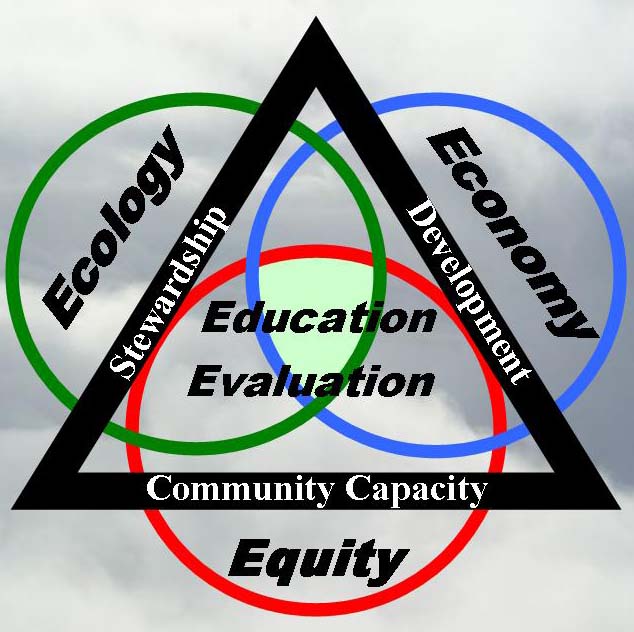|
Reliance on the coastal region of our oceans and the Great
Lakes for food, energy, international trade, tourism, and recreation
has increased and in turn so have the threats to these valuable
ecosystems. Coastal regions are more than a place for recreation.
Coastal waters and coral reefs are a storehouse of biodiversity.
Coastal areas are also absolutely essential to our economy.
Through tourism, fishing, and other industries for example,
coastal resources support one out of every six jobs in the
entire U.S.
Increasing coastal development (almost half of new development
in the U.S. occurs along the coast), overfishing, polluted
runoff, and degradation of coral reefs, however, all signal
the need for a more coordinated strategy to protect and manage
marine resources. Implementation of sound management strategies
in coastal regions thus requires integrated assessment, where
economic activity and conservation are placed on equal footing.
Five E's Unlimited has
organized and facilitated interdisciplinary teams of scientists
to design and carry-out programs of integrated
coastal ecosystem assessment. Projects have focused on
understanding the interactions of external forces and associated
responses in the coastal zone, to guide sound landscape
sustainable development. Our multi-scale ecosystem assessments
have included:
- research
into the ecology and food web interactions of estuarine/marine
communities;
- evaluation of
the proportionate coastal bay input of nutrients from
different
sources,
including external landshed input and internal sediment
recycling;
- study of the
coastal ecosystem dynamics of the South Texas continental
shelf
in the Gulf of Mexico;
- assessment of
impacts from water diversions on water quality and coastal
ecosystem
biological health;
- evaluation of the
environmental & socio-economic
importance of critical marine habitats and their biodiversity;
- review of coastal
aquaculture practices and strategy recommendations for
environmentally sensitive improvements to the culture
of fish and shellfish species;
- analysis
of environment-development interactions and policy/management
options;
- identity
of cause and effect relationship as well as emerging
issues of potential national/international importance;
and
- ability to
assess potential impacts and long-term sustainability
of alternative development, policy or management options.
Five E's works
with clients to improve stewardship of coastal regions
in order to ensure their economies remain strong. We
promote successful adaptive management and policy strategies
to
coastal ecosystem protection/restoration that
draw upon knowledge
gained from the coupling of environmental quality and
ecologic functioning with sound land-use assessments,
supported
by improved and "cutting-edge" scientific
inquiry.
We
consistently apply a systems approach to the
examination of sustainable development
in the coastal zone. This complex system is viewed and
evaluated as comprising three sub-systems: environment
and resources,
economic development, and society. A sustainability indicator
system based on these three sub-systems can be produced
to
evaluate the nature and impact of development in the coastal
zone.
We have
had a number of years of experience that allow us to:
- Develop
and deliver an approach to managing the coast that integrates
environmental, economic and social interests
on the coast.
- Develop
an inclusive approach to the management of the coastal
zone.
- Recognize
sectoral policy links.
- Ensure
consistency and integration of a strategic plan with those
of adjacent coastal areas.
We Can Assist
You In:
- Recommending
methods for monitoring the health and use of coastal
resources, demonstrating how definition of habitat quality
and understanding for basic ecosystem processes can guide
identity of protection and restoration approaches as
well as evaluation tools.
- Providing
technical advisory services and training on integrated
evaluation of data and information from many different
sources and disciplines, as well as emerging issues of
potential national/international importance.
- Analyzing
spatial landscape environment-development interaction
issues, such as urbanization, examining relationships
between land cover changes and coastal bay environmental
indicators and developing policy/management options for
effective and integrated coastal resources protection.
- Identifying
cause and effect relationships that result in potential
sectoral conflicts and recommending land-use impact mitigation
and coastal bay remediation techniques to solve disputes.
- Assessing
ecological conditions, characteristics, and potential
environmental and socio-economic impacts on long-term
coastal resource sustainability from alternative development,
policy, or management options.
- Developing
integrated adaptive coastal resources management strategies
and strengthening institutional capacity.
- Promoting
public/stakeholder participation in preparation of coastal
resources strategy and action plan development, seeking
community-based attitudes, values, opinions, and visions
related to perceived watershed development needs in relationship
to coastal bay habitats and water quality.
Five E's promotes an ecosystem approach
to adaptive management that advances community-based sustainable
development actions which are both economically and ecologically
sound.
Check
out our different coastal
zone management projects
and discover what we can do for you.
|

